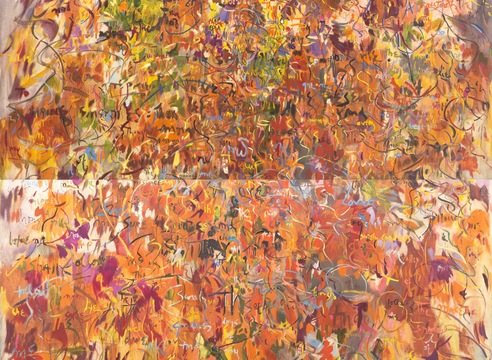
Elise Asher · Judy Bowman · Lauren dela Roche · Francesca DiMattio · Robert De Niro Sr. · Cannon Dill · Martha Edelheit · Jane Freilicher · Allison Gildersleeve · Mimi Gross · Matt Kleberg · Maynard Monrow · Sana Musasama · Galina Munroe · Helen Oji · Sylvia Sleigh · Paul Waters · Rob Wynne
Eric Firestone Gallery is pleased to announce Beauty of Summer, a cross-generational group exhibition of eighteen artists, in its East Hampton, NY gallery location. Work from the 1960s through the 1980s will be juxtaposed with contemporary painting and sculpture. Across a wide range of media and approaches, summer motifs—flowers, gardens, sunbathing—recur. Much of the abstraction and figuration on view is also characterized by a feminine aesthetic.
With this exhibition, Eric Firestone Gallery is proud to announce the representation of two artists: contemporary painter Lauren dela Roche and the estate of Abstract Expressionist painter-poet Elise Asher. Their work will be introduced by the gallery for the first time in this exhibition. The show also includes artists who the gallery has recently begun to exhibit, such as Judy Bowman and Helen Oji.
Many works in the exhibition employ a bold figuration. These include the work of French-British painter Galina Munroe (b. 1993) and Los-Angeles based Cannon Dill (b. 1991). In Munroe’s work, a close-up of a larger-than-life female torso in a floral pattern sundress fills the canvas, clasping a flower. It has an intense interiority despite the symbols of outward appearance: painted fingernails and lips. Considering herself a visual griot, Detroit-based Judy Bowman (b. 1952) tells stories through her mixed-media works on canvas that reflect her coming-of-age experiences in Detroit’s East Side and Black Bottom neighborhoods. Scenes in her lively collages depict love, community, and fellowship—the type that resides in jazzy nights, the sway of young Black women, the swag of young Black men, church on Sundays followed by family dinner, family outings, cultural dignity, and richness.
Helen Oji (b. 1950) and Mimi Gross are both painters who have also created installations and sets. Their work often exists at the meeting point of sculpture and painting. Oji’s Honeycomb / Bee Metropolis series of the 1980s were originally part of a multi-media installation in Central Park, with floating beehive sculptures. The small paintings are about 3 inches thick: painted on honeycomb cardboard with mixed media and dense impasto accretions of pigment. The forms of bees dance across the surface, nearly drowning in the paint. Originally from Sacramento, Oji lives and works in New York. She was a founding member of the Godzilla Asian American Artists Network established in 1990.
Mimi Gross (b. 1940), the artist known especially for her portraiture and group portraiture, as well as her installations including the legendary Ruckus Manhattan, works in what she terms 2 ½ dimensions. Her flower constructions—some of which were recently presented as stunning set design for Douglas Dunn’s dance choreography—are made of cut and painted wood elements, positioned in space to form standing bouquets.
Other works in the exhibition are characterized by their unusual employment of different media to create surprising and visually striking work. An eight-foot tall ceramic assemblage work by Francesca DiMattio (b. 1981) references summer with its bathing-suit-clad figure. DiMattio brings in a host of objects and techniques to create a complex assemblage of parts. For this work she cast her young children’s Legos to center play the reality of being both an artist and a mother. Each element is broken down and reassembled in a non-hierarchical manner to create a new, hybrid whole that raises questions about the construction of identity.
Rob Wynne (b. 1948) also uses a range of techniques and mediums, although poured glass is central to his work. “Breaking the rules” of glassblowing, Wynne demonstrates its malleability, shaping it into text pieces to alter meaning and suggest narratives. Maynard Monrow also makes text-based work with socio-political content and a witty attitude. His sculptures are rendered in readymade industrial formats, like cafe menu boards and stanchions signs.
Lauren dela Roche (b. 1983) is a young, self-taught artist living in St. Louis, MO. Nude female figures are the central subjects of her work. The female body is elongated and duplicated across her surfaces. They are set in decorative interiors that reference classical Greek mythology, domesticity, and dreamworlds. Dela Roche has most recently painted on found and repurposed cotton feed sacks. The textiles were previously used for farming and agriculture; dela Roche’s hand mends them as she works, allowing their histories to form another dimension to her work. Dela Roche’s interpretations of the female figure become a contemporary counterpoint, in this exhibition, to other perspectives on the female body from the 1960s and ‘70s, including the work of Robert De Niro Sr. (1922–93), Martha Edelheit (b. 1931), and Sylvia Sleigh (1916–2010).
The architectural elements in dela Roche’s work form a connection, within the show, to the paintings of Matt Kleberg (b. 1985). Although abstract, Kleberg’s forms and compositions often resemble architectural facades, altarpieces, and vacated prosceniums. In the context of this exhibition, they evoke the rainbow and oscillate between an open invitation and barrier.
Elise Asher (1912–2004) is one of the women of Abstract Expressionism, Asher’s paintings of the 1950s and 1960s blend calligraphic handwriting with color and brushwork. The personal style of these linear abstractions was Asher’s unique contribution to the movement. The work of contemporary painter Allison Gildersleeve (b. 1970) connects to that of Asher. Gildersleeve combines active, linear brushstrokes with a variety of marks to create dense paintings, using the landscape and the Sublime as their structure. They hover between known and unknown, which is where Asher’s work lives. As critic Brian O’Doherty wrote, Asher’s work “reaches back to an ancient idea of painting as a form of poetry, or poetry as a form of painting.” In this way, Asher created, as she said, a “mythic land of my own making.”
























